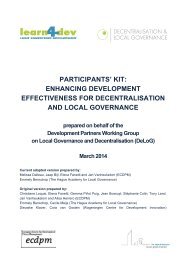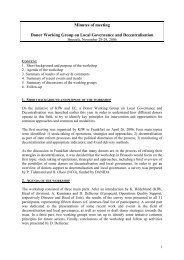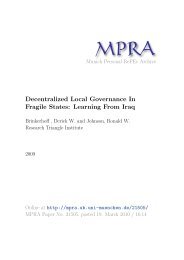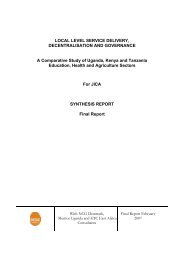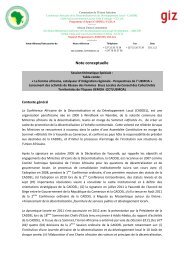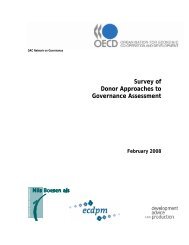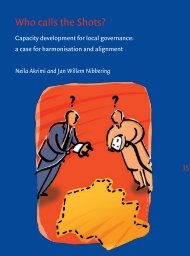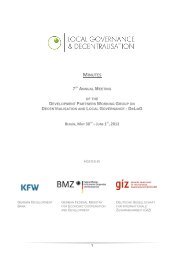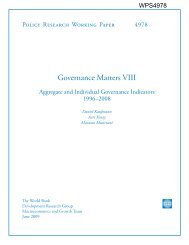Case stories on capacity development and sustainable results
Case stories on capacity development and sustainable results
Case stories on capacity development and sustainable results
You also want an ePaper? Increase the reach of your titles
YUMPU automatically turns print PDFs into web optimized ePapers that Google loves.
hutan7BHUTAN – Building capacitiesto build revenuesC<strong>on</strong>textEven in the l<strong>and</strong> of Gross Nati<strong>on</strong>al Happiness,it is essential, as Bhutan’s Departmentof Revenue <strong>and</strong> Customs’ visi<strong>on</strong> says,to ensure an effective revenue system thatc<strong>on</strong>tributes to the nati<strong>on</strong> building process.The Department has the m<strong>and</strong>ate to collecttaxes <strong>and</strong> all other revenues accruingto the Royal Government of Bhutan. Itsmissi<strong>on</strong> is to “ensure that the tax <strong>and</strong> customsadministrati<strong>on</strong> has the <strong>capacity</strong> tocollect taxes effectively at minimum cost,through impartial <strong>and</strong> c<strong>on</strong>sistent enforcementof regulati<strong>on</strong>s, <strong>and</strong> to provide a c<strong>on</strong>venient<strong>and</strong> h<strong>on</strong>est service to taxpayers.”Development <strong>results</strong>Bhutan is gradually moving away froma feudal system towards becoming amodern democratic state with operati<strong>on</strong>almarkets <strong>and</strong> a modern public sector.Since the first annual report in 1998,revenue performance has c<strong>on</strong>sistently improved,resulting directly in an increased<strong>and</strong> more reliable revenue stream for thegovernment.As ec<strong>on</strong>omic growth in Bhutan dependslargely <strong>on</strong> hydropower generati<strong>on</strong>, collecti<strong>on</strong>of revenues becomes critical. TheDepartment has been able to successfullybroaden the tax base <strong>and</strong> at least partiallyreduce reliance <strong>on</strong> revenues from hydroelectricpower by introducing pers<strong>on</strong>alincome tax <strong>and</strong> improving collecti<strong>on</strong> ofother direct taxes, particularly businesstax. Taxes made up 56 percent of total revenuein 2004-5, of which direct taxes c<strong>on</strong>tributed33 percent <strong>and</strong> 32 percent camefrom hydroelectric power sales.Enhanced performanceThe Department has achieved efficienciesthrough a range of approaches, includingdecentralizati<strong>on</strong> to regi<strong>on</strong>al offices, training,upgrading IT systems, <strong>and</strong> publiceducati<strong>on</strong> <strong>on</strong> compliance.The Department of Revenue <strong>and</strong> Customswas created in 1986, following the restructuring<strong>and</strong> merger of two previously separatedepartments of revenue <strong>and</strong> customs.ResultsSince 1998, revenue performance hasc<strong>on</strong>sistently improved, resulting in an increased<strong>and</strong> more reliable revenue stream.The tax base has been broadened <strong>and</strong> reliance<strong>on</strong> revenues from hydroelectric power has beenreduced by introducing pers<strong>on</strong>al income tax <strong>and</strong>improving collecti<strong>on</strong> of direct taxes.The cost per collecti<strong>on</strong> of Nu 100 is 1.9, astriking statistic that compares favorably in theinternati<strong>on</strong>al c<strong>on</strong>text.Taxpayer compliance has increased as a result ofan effective educati<strong>on</strong> programme.




